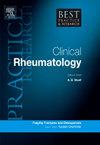热带人群风湿病流行病学研究。
IF 4.8
2区 医学
Q1 RHEUMATOLOGY
Best Practice & Research in Clinical Rheumatology
Pub Date : 2025-05-01
DOI:10.1016/j.berh.2025.102059
引用次数: 0
摘要
热带风湿病(TRDs)可由感染性和非感染性原因引起。一般风险因素和特定疾病风险因素被认为是这些疾病在热带地区流行的原因。温度和湿度较高等易感因素在热带国家很常见。其他风险因素包括人口密度高、营养不良、受教育机会不足和医疗基础设施薄弱。对于大多数前驱性疾病来说,挑战在于管理环境因素、病媒以及病媒与宿主之间的相互作用。控制逆转录病毒的战略包括应对和考虑森林砍伐和城市化、旅行和移民的增加、气候变化以及传染源和病媒的遗传和繁殖模式的变化。TRD的管理涉及个人或社区、环境、政治或组织层面。需要注意的是,许多 TRD 现在已不仅仅局限于热带地区。本文章由计算机程序翻译,如有差异,请以英文原文为准。
Epidemiology of rheumatic diseases in tropical populations
Tropical rheumatic diseases (TRDs) can be due to infectious as well as non-infectious causes. General and disease-specific risk factors have been identified as reasons for the prevalence of these diseases in the tropics. Predisposing factors such as higher temperatures and humidity are common in tropical countries. Other risk factors include high population density, poor nutrition, inadequate access to education and poor healthcare infrastructure. For most TRDs, the challenges are managing environmental factors, vectors, and interactions between them and the hosts. Strategies to control TRDs include tackling and accounting for deforestation and urbanization, increased travel and migration, climate change, and changes in the genetics and breeding patterns of infectious agents and vectors. The management of TRDs is taken up at individual or community, environmental, and political or organizational levels. It needs attention, as many of these TRDs are not now restricted to only the tropics.
求助全文
通过发布文献求助,成功后即可免费获取论文全文。
去求助
来源期刊
CiteScore
9.40
自引率
0.00%
发文量
43
审稿时长
27 days
期刊介绍:
Evidence-based updates of best clinical practice across the spectrum of musculoskeletal conditions.
Best Practice & Research: Clinical Rheumatology keeps the clinician or trainee informed of the latest developments and current recommended practice in the rapidly advancing fields of musculoskeletal conditions and science.
The series provides a continuous update of current clinical practice. It is a topical serial publication that covers the spectrum of musculoskeletal conditions in a 4-year cycle. Each topic-based issue contains around 200 pages of practical, evidence-based review articles, which integrate the results from the latest original research with current clinical practice and thinking to provide a continuous update.
Each issue follows a problem-orientated approach that focuses on the key questions to be addressed, clearly defining what is known and not known. The review articles seek to address the clinical issues of diagnosis, treatment and patient management. Management is described in practical terms so that it can be applied to the individual patient. The serial is aimed at the physician in both practice and training.

 求助内容:
求助内容: 应助结果提醒方式:
应助结果提醒方式:


